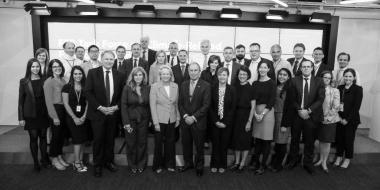In response to the Task Force’s first report, CDSB and CDP have submitted their views and recommendations.

The FSB Task Force on Climate-related Financial Disclosures (TCFD) released their Phase I report on the 31st March 2016, detailing the scope and high-level objectives for their proposed work, a set of fundamental principles of disclosure and a guide to the Task Force’s Phase II recommendations.
During the consultation period, CDSB and CDP submitted a joint response to this report highlighting recommendations, some of which are summarised below. The detailed response is available here.
Overall, the key concerns and 7 principles of effective disclosure outlined in the Phase I report align with our views. To further this, we recommend that the Task Force also considers sector materiality with flexibility for a wide range of risks and opportunities. Additionally, a common taxonomy which can be used and understood by disclosers and users is key. It is important that leaders are recognised and companies falling behind should be encouraged to a high standard of practice.
Transitional Risk
The Task Force also highlights Transition Risk which is an evolving term, making it problematic to use. In our response we also highlighted new accounting rules by the International Accounting Standards Board, which may be relevant to reporting climate-related transition risks as well. IFRS 9 requires entities to measure expected credit losses of a financial instrument using factors that are specific to the entity, general economic conditions and an assessment of both the current and forecasted direction of conditions at the reporting date.
There is also a requirement for clearer context of transitional risk for decision-making so that firms and investors know the parameters within which they should act, the scenarios against which to stress test and criteria against which their actions will be assessed.
Existing effective disclosure practices
Existing disclosure practices on climate risk and opportunities are being used by financial organisations to a variable level of effectiveness. Stranded asset risk has had variable levels of useful disclosure so far, but analysts have tried to use what companies have disclosed to calculate this and to reach conclusions. In addition, 2-degree stress testing is an effective way for investors to get a picture of how companies are placed going forward but is still not widespread or at a high enough standard.
Barriers to overcome
The barriers to the Task Force’s work include:
- Identifying what information is material and realistic to be reported.
- Tension between focusing only on entity specific risks vs on just system wide exposures.
- Addressing feasibility of consistency within existing mainstream reporting requirements and practices.
- Distinguishing Climate Related Financial Information from general climate change information.
- Achieving consistency and comparability when many differences in international law and practice exist.
- Discrepancies between corporate and investor view of risk.
Measuring success
The definition of success will encompass a range of outcomes including where the Task Force can complement existing legal and regulatory reporting requirements. Current corporation climate reporting requirements can be adopted and enhanced, with consideration of existing corporate responses. Furthermore, success can be measured by the implementation and uptake of the Task Force’s recommendations across the G20, ultimately resulting in improvements in quality and quantity of disclosures.
Recommendations for Phase II
As a whole, we agree that the Task Force is focused on the appropriate set of topics for its Phase II work plan. However, consideration could also be given to:
- Recommendations with the overview of the current reporting landscape in so far as it requires climate disclosure.
- Recommendations on organisational boundary setting.
- Develop ideas on how Climate-related financial information could be linked or connected with other information in mainstream reports.
- Plans beyond 2016, including a roadmap for the adoption of the Task Force’s recommendation.
We look forward to supporting the Task Force in the next phase of their work.